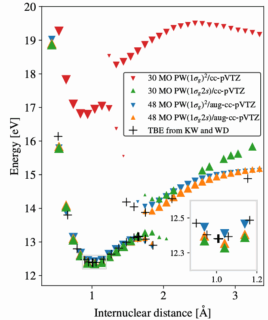Orbital Optimization and NNCI Calculations of Rydberg States
We are excited to announce the latest results from the collaboration with our Icelandic friends from theoretical chemistry as new preprint on arXiv. Our joint work tackles the long-standing challenge of accurately describing Rydberg excited states—molecular states characterized by extremely diffuse electron distributions that are poorly captured by standard atomic basis sets. The study introduces a state-specific orbital optimization in plane-wave Hartree–Fock calculations, followed by Neural-Network Configuration Interaction (NNCI) to achieve near-full-CI accuracy with dramatically reduced determinant spaces.
Key contributions include:
- Orbital optimization for excited states: Demonstrated to substantially improve convergence and accuracy for diffuse Rydberg orbitals (e.g., 2s in H₂) compared to traditional aug-cc-pVTZ and aug-cc-pVQZ approaches.
- NNCI extension to excited states: An efficient, iterative, machine-learning-based selective CI scheme that reproduces benchmark results for NH₃ and H₂O Rydberg states with only ~10⁵ determinants—five orders of magnitude fewer than full CI.
- Results: Excitation energies for 3s, 3pₓ, and 3p_y states are in close agreement with both experiment and high-level theoretical benchmarks (EOM-CCSDTQ, exFCI), confirming the effectiveness of the combined plane-wave + NNCI strategy.
Authors: Gianluca Levi, Max Kroesbergen, Louis Thirion, Yorick L.A. Schmerwitz, Elvar Ö. Jónsson, Pavlo Bilous, Philipp Hansmann, and Hannes Jónsson
Date: October 30, 2025 (accepted in JCTC on February 25, 2026)
arXiv: https://arxiv.org/abs/2510.26751
